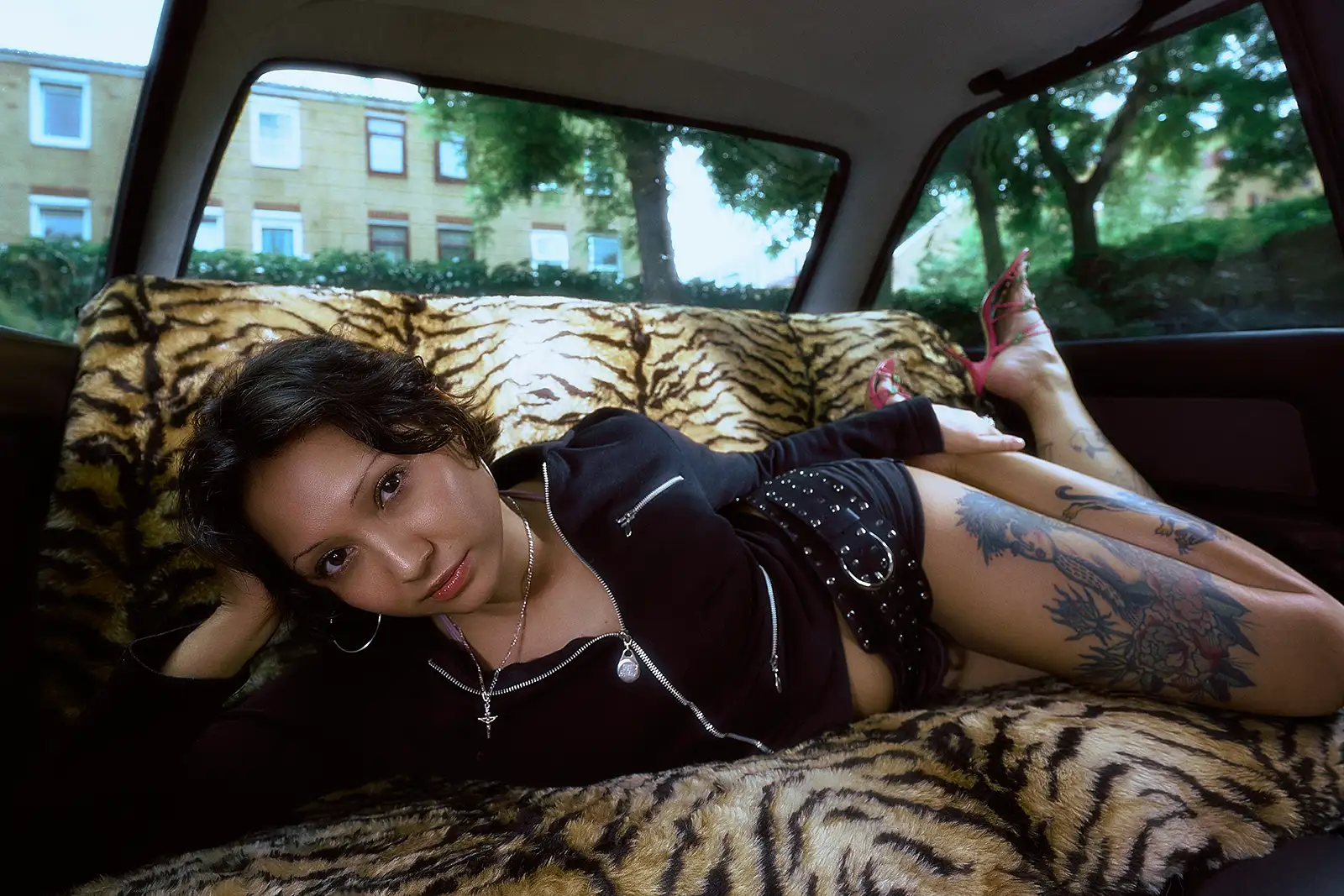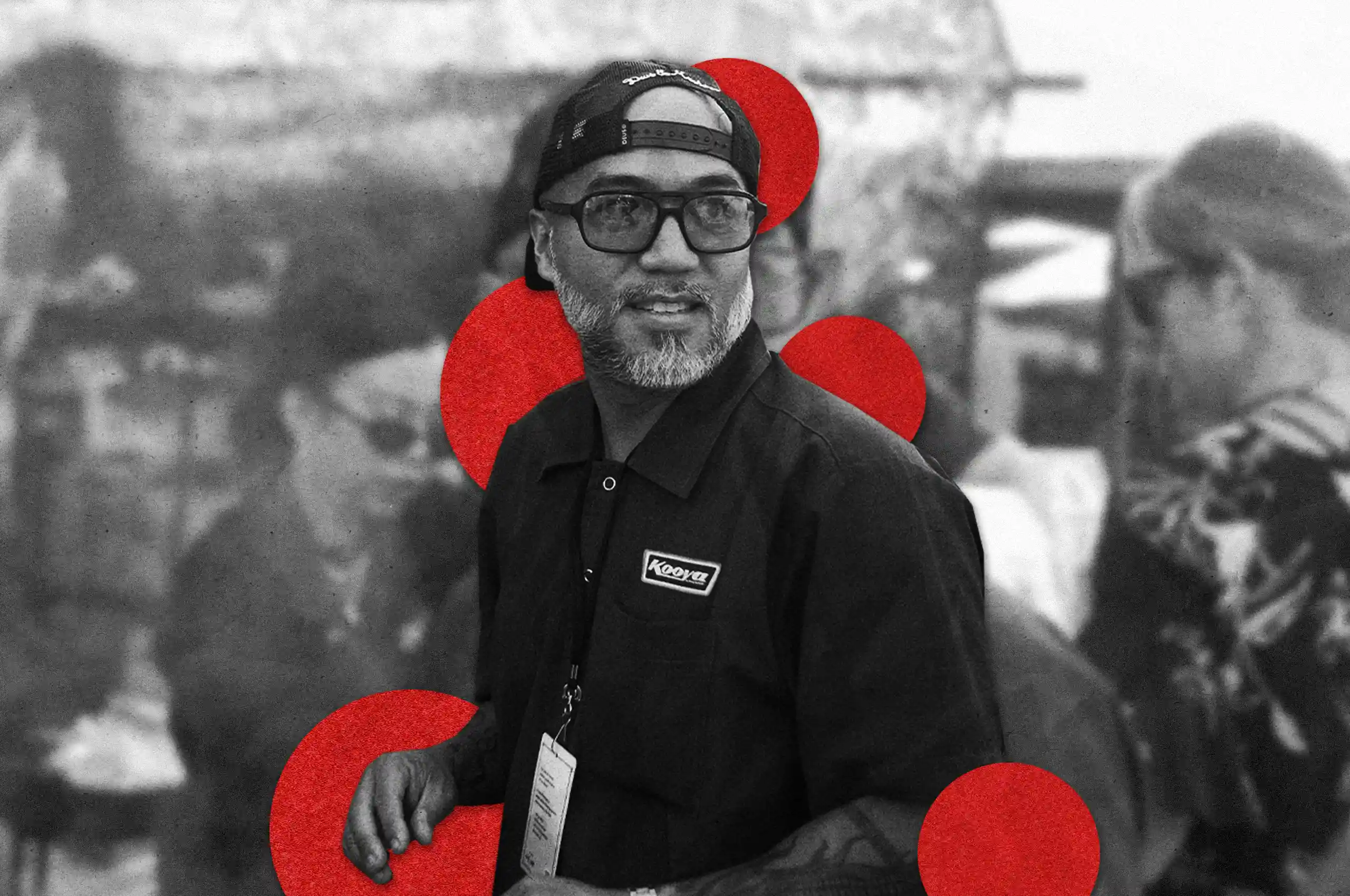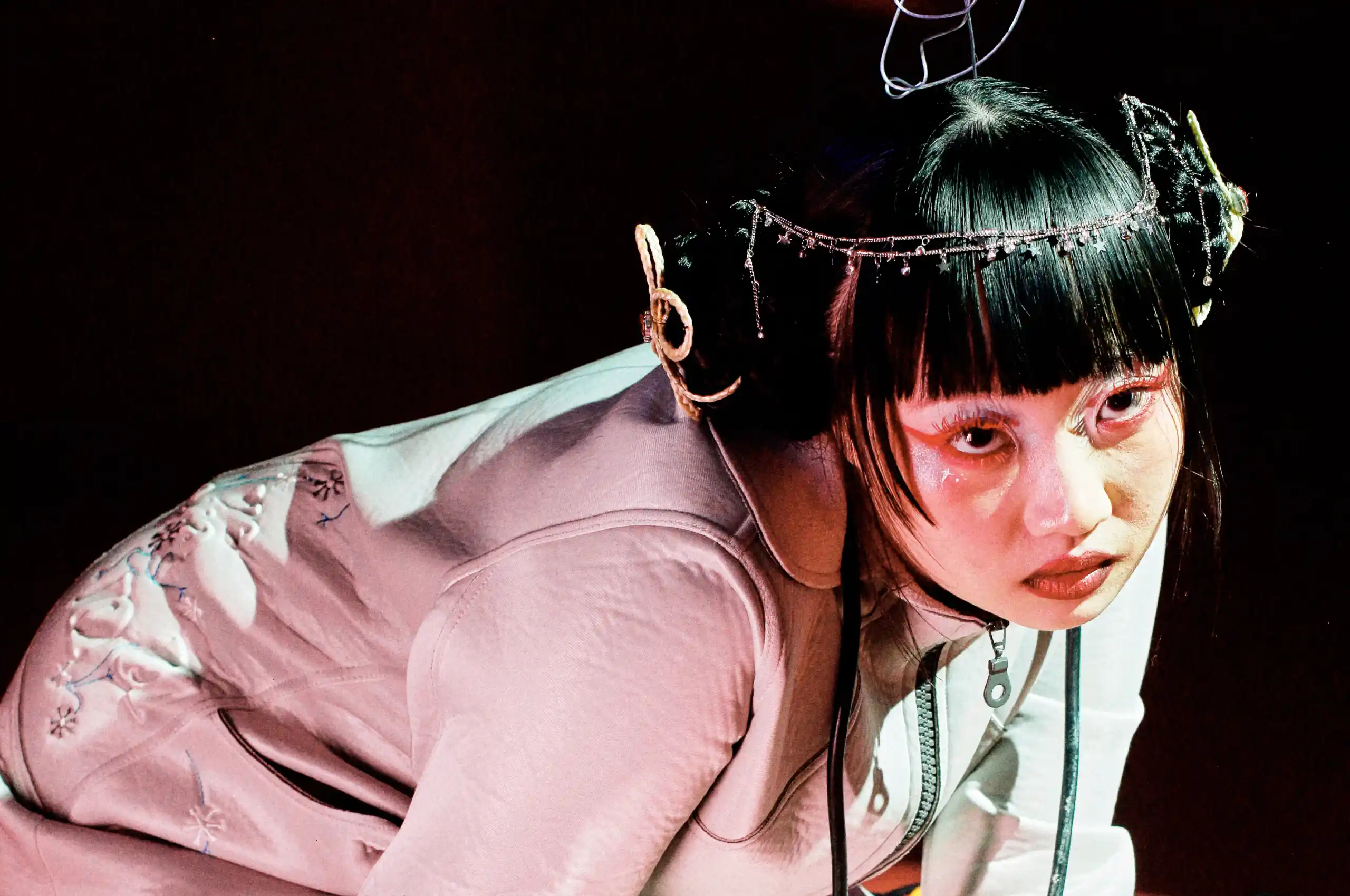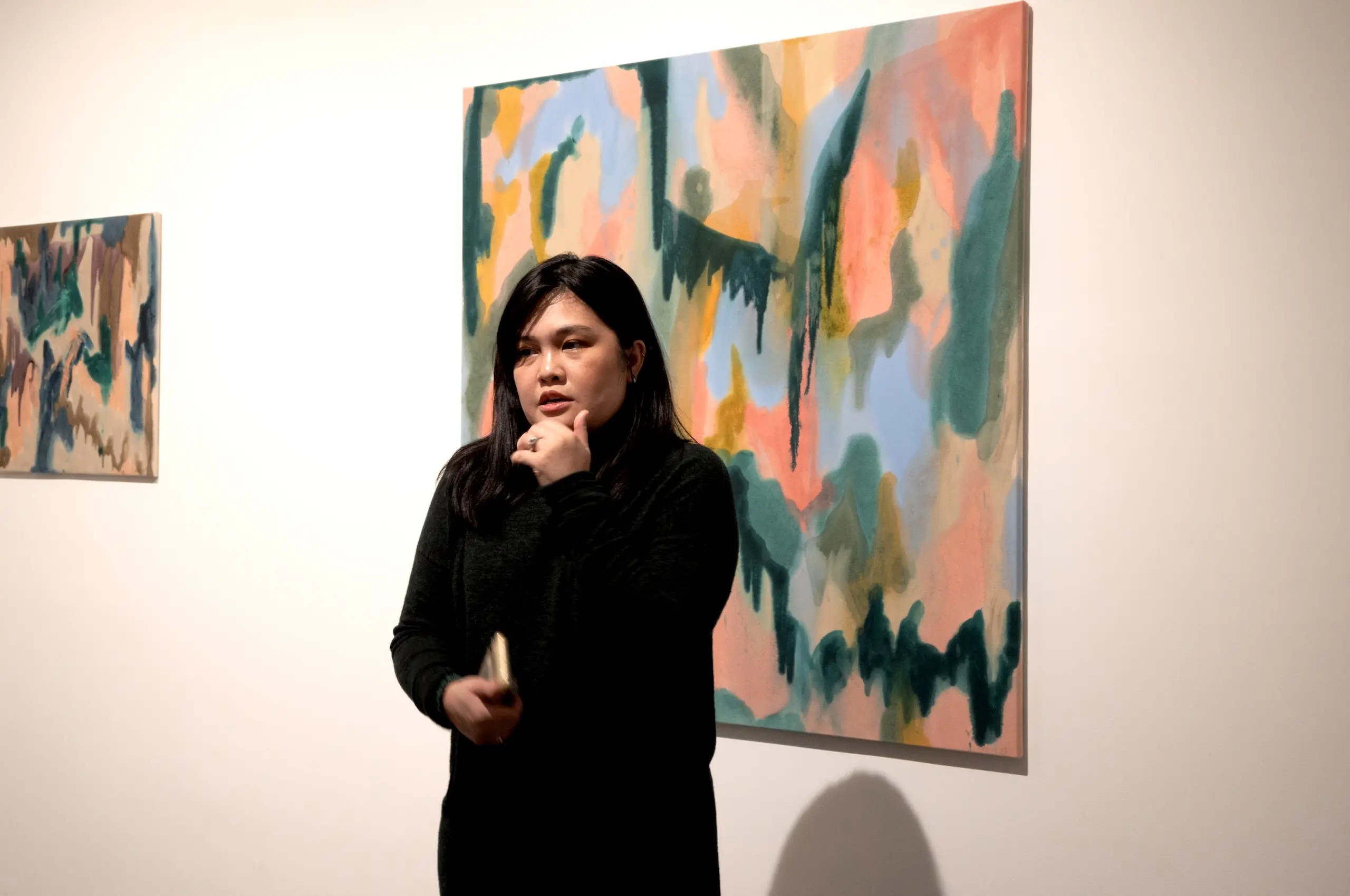This story is part of “This Is Not A Phase,” Rolling Stone Philippines’ Pride Month storytelling campaign. Featuring the unapologetic individuals who refuse to back down on who they truly are, “This Is Not A Phase” highlights stories that challenge what’s considered acceptable in Filipino LGBTQIA+ culture.
To learn about Serena Pasion’s music is to look no further than the name she’s built over the past decade. Better known as Peach, a Canadian producer and DJ based in London, her sound possesses a quintessentially nectarine quality: bright and lush; at times, fuzzy and sexy.
In November 2023, Pasion, who is of Filipino-British descent, made her debut in the Philippines inside a warehouse in Makati. She was joined by a lineup of local DJs and an impassioned crowd of dancers — all of whom, under a policy implemented by the party organizers just a month prior, were prohibited from taking photos and videos, since entry required a sticker slapped onto the camera of guests’ cell phones.
In Manila’s relatively small dance music scene where exposure functions as a form of social currency, the “no photo, no video” policy felt like a deliberate attempt by UNKNWN, the party organizers, to emulate the nightlife cultures of Europe and North America, which offer spaces for uninhibited and anonymous forms of partying. This novelty felt like a major moment for Manila, and while Pasion is no stranger to all types of dance floors — whether it’s Berghain’s Panorama Bar in Berlin, which is notorious for adopting the same policy, or world-renowned festivals like Glastonbury in England and Barcelona’s Primavera — her Manila gig felt surprisingly intimate; not because of the party’s scale, which, in fact, drew hundreds of people, but because of how personal the experience felt to her.
“The first and only time I ever went to the Philippines was to play there,” Pasion says, who describes her “insane” trip to Asia in 2023 as her first proper tour of the continent. She had no expectations of how a Filipino dance floor would respond to her music, but Pasion noticed a freedom that, she says, is not guaranteed in every gig.
“I felt like I was returning to a place I’d never been [to] before,” she said. “[Being] surrounded by people that look like me was just really special, and quite emotional.”
A Formative Dance

Pasion grew up between Mississauga and Oakville in the Greater Toronto Area — home to Canada’s largest Filipino community — and, in true Filipino fashion, she was surrounded by family who shared her passion for music.
“I realize now the choices I make within music are very melodically driven,” she says, recalling her childhood spent collecting CDs of the Backstreet Boys and Avril Lavigne. Pasion remembers distinct memories of her father, a Manila native, listening to a wide range of genres — from punk and new wave bands like The Ramones and Toto Coelo, to the latest hip-hop and R&B on Toronto’s Flow 98.7 FM radio station. A British‑Canadian uncle from her mother’s side would bring his guitar to Christmas gatherings, belting out The Knack’s “My Sharona” while swapping in the refrain with “My Serena.” Her grandmother, who is natively from Aparri, Cagayan, once gifted Pasion a karaoke machine, while Pasion’s first real glimpse into DJing came from a Filipino uncle who worked the decks at family functions. “I didn’t think too deeply about it,” she says. “It was just like, there’s my uncle, the DJ, getting on the mic.”
Dance music entered Pasion’s lexicon in 2008 as commercial EDM, particularly electro house, broke into the mainstream. Her early references include Pillowface and His Airplane Chronicles, the debut mixtape of American DJ and producer Steve Aoki, as well as Laidback Luke, another DJ and producer of Filipino and Dutch descent. She notes how she saw Laidback Luke multiple times throughout her growth in dance music, describing how she was “obsessed” with that “fucking sick” era of his career.
“I went up to him and I was like, ‘Oh, I’m Filipino,” Pasion recounts. “Then the second time I saw him, I brought it up again, and he was like, ‘I remember you! Pinoy pride!’” To this day, Pasion still plays old Laidback Luke records from the ‘90s – a darker, groovier sound that contrasts with the ostentatious, build-and-drop approach he became famous for in the late 2000s.
By the early 2010s, as the EDM industry grew bigger in sound and scale, Pasion, like many EDM enthusiasts of that time, began to seek out other niches in dance music. “I think I just got bored, and I was surrounded by a group of friends who were really into minimal,” she said. “They showed me [the London-based label] Hot Creations and [the video platform] Dancetrippin.tv, which opened up a world of DJs playing in different parts of the world… [but] I’ve always discovered music through seeing DJs, and I still take time to be on the dance floor because that’s important to me.”
“One of the main ways I [label] my records is ‘house-y,’ ‘sassy,’ ‘fun,’ ‘chic,’ and ‘sexy,’ because those are things I want people to feel dancing to my music.”
Showing Up
Living the life of a DJ is more than just playing music; it’s about mastering the act of showing up, and Pasion showed up in many ways as she fell deeper into the dance music rabbit hole.
After she moved to Ottawa for university — a city she describes as “quite boring” — she would take two-hour bus rides to Montreal to attend her first-ever raves. When she began learning how to DJ in 2011, her boss at the club she was bartending in gave her a chance to open alongside acts like Derrick Carter, a prominent figure of the Chicago house scene, and deadmau5, a Canadian producer who, at that time, was topping the Billboard Dance charts in the United States. She tells me this fact rather hesitatingly: “Bless Graham for giving me a chance so early on when I was honestly fucking horrible,” she laughs. “I don’t even want to think about what I was playing then.”
Pasion was, without question, a party girl, who hosted “insane after-party ragers” in Toronto that was even surveilled by the police, suspecting it was an illegal after-hours club. But coming from a specific discipline of music discovery rooted in online music blogs, she admits there were key references in dance music she didn’t fully understand early on. But an epiphany came when a friend showed her a crate of new vinyl records he brought back from Berlin.
“In 2013, my friend introduced me to Hard Wax,” referring to one of Berlin’s oldest record stores for rare electronic music, opening shortly after the fall of the Berlin Wall in 1989. Artists whose records are stocked in Hard Wax often use the most minimal modes of distribution — at times, purposefully disregarding mainstream channels like digital streaming. “He introduced me to the foundations [of vinyl digging], and the realization that there was such a big world of dance music I had never explored,” Pasion says.
As one delves deeper into DJing, holding onto that sense of discovery becomes an art form in its own right. To dig is to excavate, and the best DJs don’t just show up to parties; they show up to their music, taking them physically, emotionally, and creatively to the most unlikely places.
Scraping Closer

To Pasion, showing up to her music meant beginning her pseudonym, Peach, in 2015, and moving to London in 2016. “There are only so many artists that trickle through into North America,” she explains, “In London, you could just see all these DJs on a Thursday, and I thought [that] was so wild.”
Slowly, Pasion chipped away as Peach in London’s dance music scene, frequenting clubs like Corsica Studios, a venue that has hosted global acts like Björk and Four Tet. She has also shared lineups with producers like Jon Hopkins, Peggy Gou, and Midland — the latter being one of Pasion personal favorites, whom she first saw perform at Amsterdam’s Dekmantel Festival in the summer of 2015. In 2018, the same year Pasion quit her advertising job to pursue music full-time, she collaborated with Midland to release her glittery debut single “Silky” under his label, Graded Records. A full circle moment also came in 2023 when Peach performed in Dekmantel for the first time alongside Shanti Celeste, a friend and close collaborator.
Pasion showed up wherever her intuition took her, but nothing could have prepared her for the attention that her debut Boiler Room set would attract. Part of a showcase spotlighting Manchester’s queer rave community, her set as Peach, titled “House Pumpers” on YouTube, became something of a viral sensation, garnering 1.7 million views since its release in 2018. “I literally played last weekend, and somebody came up to me and was like, ‘I loved that Boiler Room [set],” she says. “It will never die, and that’s fine.”
“I felt like I was scraping closer to who I was. But it definitely came at the cost of doing it in front of a lot of people.”
Pasion describes a certain timelessness in that set, offering a snapshot of the music she loved during that period in her life; a friend who has since passed away is even seen dancing in the background. Yet, the invitation to play on one of dance music’s most prominent platforms, let alone in a queer-focused showcase, carries a certain weight, thus marking a deeply public and personal reckoning. To be a bisexual woman with many male friends, or with a partner of the opposite sex, created assumptions that often made Pasion feel she wasn’t queer enough.
“I was nervous and still quite cagey about my sexuality [at the time],” she says. “I remember there was a sign at Boiler Room that said ‘bisexuality is real,’ and I took a picture with it. It felt scary to post and show that to people.”
She adds, “It took being surrounded by other queer people to realize I’ve always known this [about myself],” as she credits queer parties like Chapter 10 in London and books like The Bi-ble: An Anthology of Essays on Bisexuality with helping ease into her self-discovery. Because to Pasion, discovery is synonymous with showing up — an act of intimacy she has granted to her music and herself. “I felt like I was scraping closer to who I was,” she says, reflecting on the years following Boiler Room and into the pandemic. “But it definitely came at the cost of doing it in front of a lot of people.”
A Dream Come True

Needless to say, Pasion has adapted to a fast-evolving music landscape by insisting on her approach as a DJ and producer. Inspired by her esoteric interests, Pasion’s record label Psychic Readings, launched in 2022, allows her music to extend into other parts of her artistic language.
“There’s something about mysticism and the occult that feels really feminine,” she notes, admitting that in dance music, presenting as more femme or masc is somewhat tied to being taken seriously. But this seems to be the least of Pasion’s concerns, who has “stopped giving a fuck” about whether, in the eyes of others, wearing a spaghetti top made her seem less of an artist. “One of the main ways I [label] my records is ‘house-y,’ ‘sassy,’ ‘fun,’ ‘chic,’ and ‘sexy,’ because those are things I want people to feel dancing to my music,” she says. She has also maintained a sense of humor that feels lost in certain niches of dance music today. In describing the artwork of Psychic Readings releases, which often feature her favorite colors — pink and purple — she jokes that the label is her way of paying homage to the bisexual flag.
“I was nervous and still quite cagey about my sexuality [at the time]. I remember there was a sign at Boiler Room that said ‘bisexuality is real,’ and I took a picture with it. It felt scary to post and show that to people.”
As global dance music becomes increasingly mass-produced, whether as bite-sized reels or mega music festivals, Pasion wants to redirect her focus on more deliberate forms of connection. Dreamland, a new platform launched on June 9, offers her audience an open line of communication while consolidating the breadth of her work as Peach, whether it’s her music releases, DJ mixes, or first access to club nights, which uses a physical card specifically designed for Dreamland. It’s a callback to more tactile forms of communication where even its website is reminiscent of a bygone internet, once more textured, personal, and unoptimized for virality.
“These days, artists are pressured to be in front of a camera, but I feel like I can connect with people without abiding by the algorithm,” Pasion says. While she acknowledges that there’s no shame in artists choosing to perform on bigger platforms, she observes that the art of an intimate dance floor remains understated, especially as small, grassroots spaces struggle to stay open.
“I don’t think [Dreamland] is everybody’s answer, and I don’t think it’s the industry’s answer. But there’s always going to be people going bigger and bigger, and my heart and energy [are] focused on building a more direct community.”
Which brings us back to the Philippines — a place that, on a physical and personal level, feels like uncharted territory for Pasion.
“I need to spend more time there,” she says, adding that she can feel the potential of learning more about herself, albeit in a place she didn’t grow up in. “Touring around Asia is when I feel my most comfortable, my [happiest], and my hottest… There’s obviously a deep connection, and that’s amazing.”
Photography by Helena Bermejo







